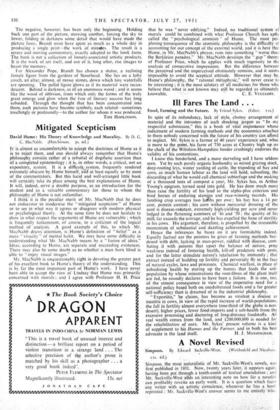Mitigated Scepticism
David Hume: His Theory of Knowledge and Morality. By D. C. C. MacNabb. (Hutchinson. 75. 6d.) IT is almost as uncomfortable to actept the doctrines of Hume as it is to reject them, and one should always remember that Hume's philosophy consists rather of a rebuttal of dogrhatic assertion than of a completed epistemology ; it is, in other words, a critical, not an expository, system. It is a difficuJitoystem, frequently rendered extremely obscure by Hume himself, an at least equally so by most of the commentators. But this lucid and well-arranged little book will certainly take its place among the best explanations of Hume. It will, indeed, serve a double purpose, as an introduction for the student and as a valuable commentary for those to whom the philosophy of Hume is not unfamiliar.
I think it is the peculiar merit of Mr. MacNabb that he does not endeavour to modernise the "mitigated scepticism" of Hume or to see in what way it agrees or disagrees with modern physical or psychological theory. At the same time he does not hesitate to show in what respect the arguments of Hume are vulnerable ; which is frequently tantamount, of course, to a criticism of the logical method of analysis. A good example of this, to which Mr. MacNabb draws attention, is Ilume's definition of " belief " as a mere " vivacity " of mental habit. We may have some difficulty in understanding what Mr. MacNabb means by a "fusion of ideas." Ideas, according to Hume, are separate and succeeding existences. There may also be some doubt as to whether a man born blind is able to "enjoy visual images."
Mr. MacNabb is unquestionably right in devoting the greater part of his excellent book to Hume's theory of the understanding. This is by far the most important part of Hume's work. I have never been able to accept the view of Lindsay that Hume was primarily concerned with morals ; and I agree with Professor H. H. Price
that he was "never edifying." Indeed, no traditional system of morals could be combined with what Professor Church has aptly called the "psychological atomism" of Hume. The most per- plexing 'consequence of the atomistic philosophy is the difficulty of accounting for our concept of the external world, and it is here that Hume, in Mr. ManNabb's phrase, runs into something "worse than the Berkleian paradox." Mr. MacNabb develops the " gap " theory of Professor Price, which he applies with much ingenuity to the analysis of consecutive impressions. But the difference between the perceived and the unperceived obstinately remains, and it seems impossible to avoid the sceptical attitude. However that may be, Hume's philosophy, the "rational Metaphysic," will never cease to be interesting ; it is the most salutary of all medicines for those who believe that what is not known may still be regarded as ultimately


































 Previous page
Previous page